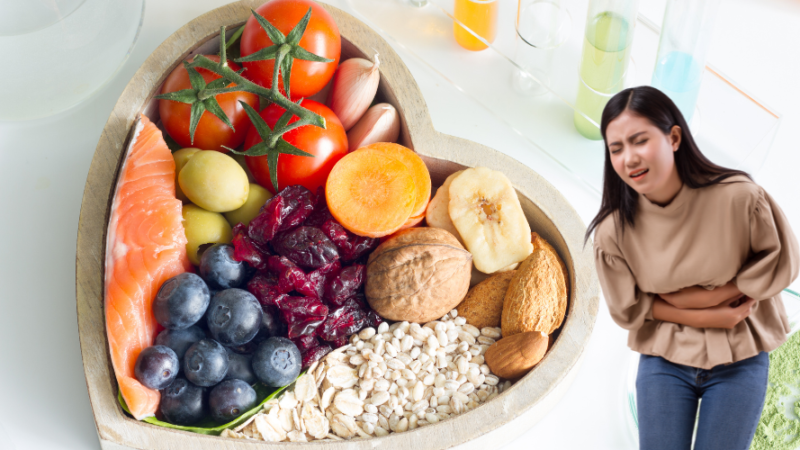Stevia vs. Sugar: Which Sweetener is Right for You?
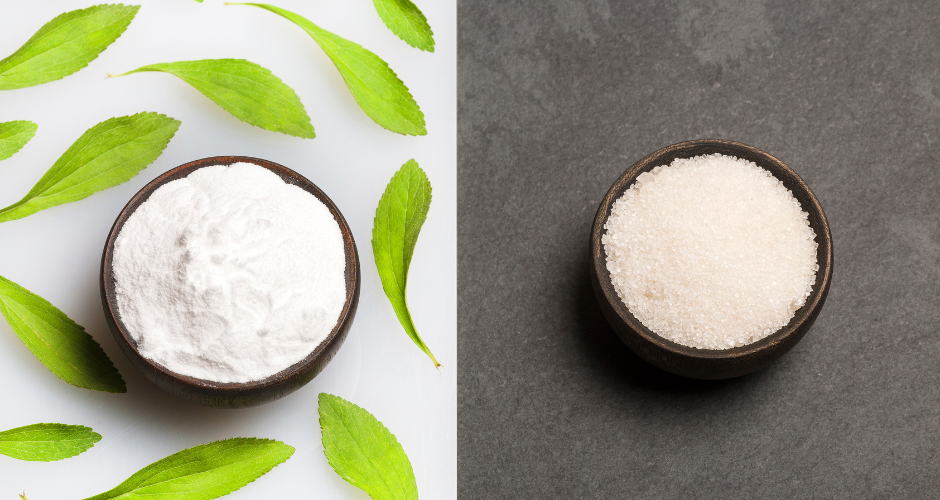
Are you caught in the sweet dilemma of choosing between Stevia and sugar? With the rising awareness of health and wellness, the debate over which sweetener to use has never been more pertinent.
Whether you’re trying to cut calories, manage your blood sugar levels, or simply seeking a healthier lifestyle, understanding the pros and cons of Stevia and sugar is crucial. Explore Stevia vs. Sugar detailed comparison to find out which sweetener suits your health goals and taste preferences!
What is Sugar?
Sugar, specifically sucrose, is a carbohydrate derived from sugar cane or sugar beets. It’s a natural ingredient found in many foods and drinks, widely used in cooking and baking due to its sweet taste and versatility. However, excessive consumption of sugar has been linked to various health issues, including obesity, type 2 diabetes, heart disease, and tooth decay.
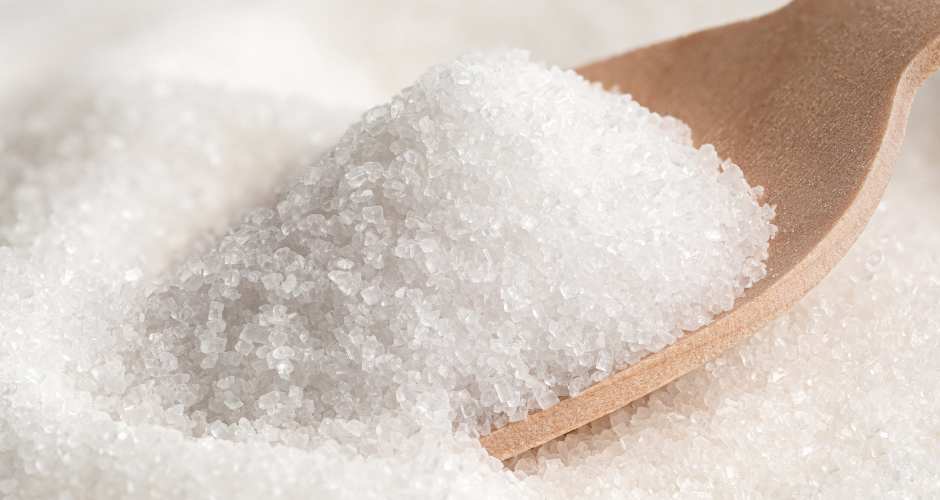
Pros of Sugar:
- Taste and Texture: Sugar provides a familiar taste and texture, making it a staple in many recipes.
- Energy Source: Sugar is a quick source of energy because it is easily metabolized by the body.
Cons of Sugar:
- Calorie Content: Sugar is high in calories, contributing to weight gain if consumed in excess.
- Health Risks: High sugar intake is associated with increased risks of chronic diseases.
- Blood Sugar Spikes: Sugar can cause rapid spikes in blood glucose levels, leading to energy crashes and cravings.
What is Stevia?
Stevia is a natural sweetener derived from the leaves of the Stevia rebaudiana plant. It’s known for being intensely sweet—up to 200-300 times sweeter than sugar—but contains no calories or carbohydrates. Stevia has gained popularity as a healthier alternative for those looking to reduce their sugar intake without losing sweetness.
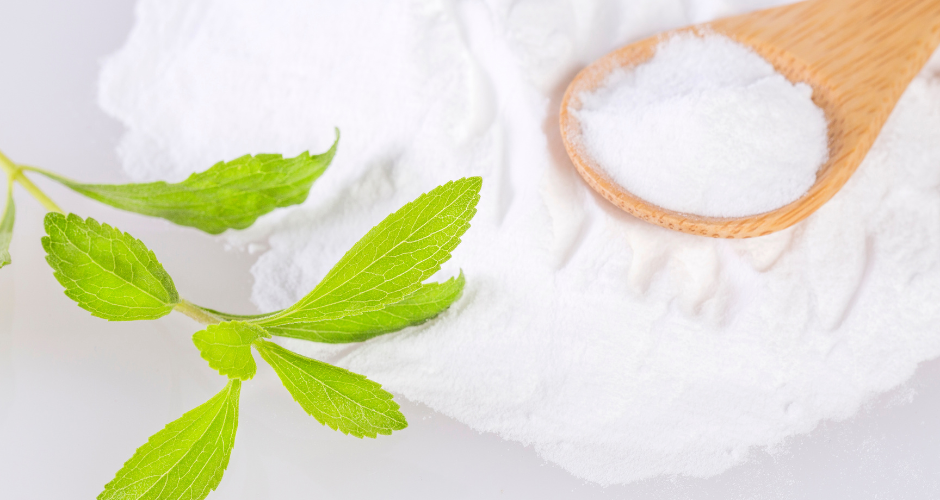
Pros of Stevia:
- Zero Calories: Stevia contains no calories, making it an excellent choice for weight management.
- Glycemic Index: Stevia has a negligible effect on blood glucose levels, making it suitable for diabetics.
- Natural Origin: Unlike artificial sweeteners, Stevia is derived from a plant, which appeals to those seeking natural food products.
Cons of Stevia:
- Taste: Some people find Stevia to have a slightly bitter or licorice-like aftertaste, which can affect the flavor of certain dishes.
- Cooking and Baking: Stevia doesn’t caramelize or provide the same texture as sugar, which can impact baking results.
- Availability and Cost: Stevia can be more expensive and less widely available than sugar, though this is changing as its popularity grows.
Health Implications
When considering health implications, Stevia is generally regarded as a healthier option compared to sugar. Here’s why:
- Weight Management: Stevia’s zero-calorie content makes it an ideal sweetener for those looking to lose weight or maintain a healthy weight.
- Diabetes Management: Stevia does not raise blood sugar levels, making it a safe alternative for people with diabetes.
- Dental Health: Unlike sugar, Stevia does not contribute to tooth decay.
On the other hand, while sugar is a natural energy source, its high caloric content and potential health risks make it less favorable for those trying to manage their weight or control blood sugar levels.
Practical Uses in Cooking and Baking
When substituting Stevia for sugar in recipes, it’s important to understand how it behaves differently:
- Baking: Stevia lacks the bulk and chemical properties of sugar, which can affect the texture and rise of baked goods. To compensate, you might need to adjust the recipe by adding a bulking agent like applesauce or yogurt.
- Taste Adjustments: Start with small amounts of Stevia, as it is significantly sweeter than sugar. You may need to experiment to find the right balance for your taste.
- Caramelization: Since Stevia does not caramelize like sugar, it’s not suitable for recipes that rely on this process, such as caramel or toffee.
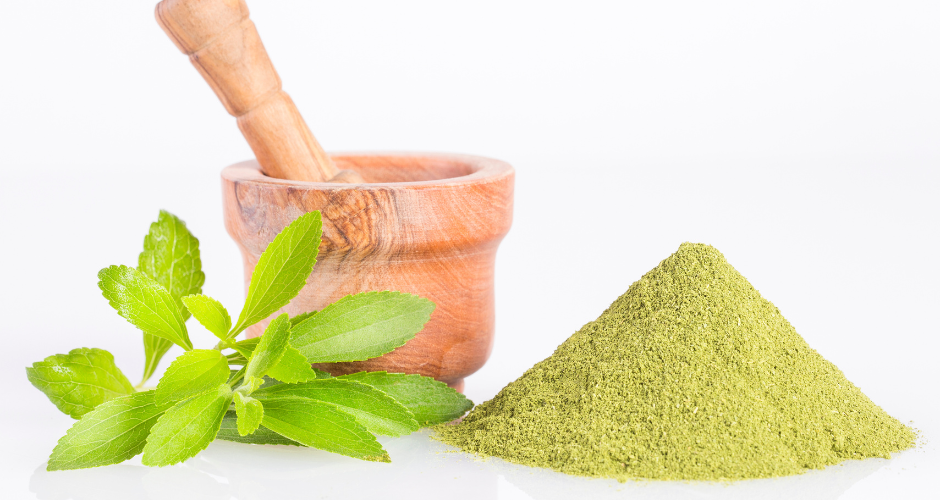
Making the Choice: Which is Right for You?
Choosing between Stevia and sugar depends on your dietary needs, health goals, and personal preferences. Here are some guidelines to help you decide:
- Weight Loss: If you’re trying to lose weight or reduce calorie intake, Stevia is a better choice due to its zero-calorie content.
- Diabetes Management: For those managing diabetes, Stevia is preferable as it doesn’t affect blood sugar levels.
- Taste Preferences: If you prefer the taste and texture of sugar and don’t have health concerns related to sugar intake, you might choose to use it in moderation.
- Baking Needs: For traditional baking where texture and caramelization are crucial, sugar might still be the better option.
Conclusion
Both Stevia and sugar have their own set of benefits and drawbacks. While sugar is a familiar and versatile ingredient, its health risks cannot be ignored. Stevia, on the other hand, offers a healthier alternative, particularly for those looking to manage their weight or blood sugar levels.
Ultimately, the choice between Stevia and sugar will depend on your individual health goals, dietary needs, and taste preferences. By understanding the differences between these sweeteners, you can make an informed decision that aligns with your lifestyle.
FAQ’s
Is Stevia a Good Substitute for Sugar?
Yes, Stevia is an excellent substitute for sugar, especially for those looking to reduce calorie intake, manage blood sugar levels, or pursue a healthier lifestyle. Derived from the leaves of the Stevia rebaudiana plant, it is a natural sweetener that is up to 200-300 times sweeter than sugar but contains no calories or carbohydrates. Stevia is ideal for people with diabetes, those on a weight-loss journey, or anyone looking to avoid the health risks associated with excessive sugar consumption.
Is Stevia Safe to Use?
Yes, Stevia is considered safe for use by various health authorities, including the Food and Drug Administration (FDA) and the World Health Organization (WHO). It has been extensively studied, and its safety profile is well-established. However, as with any food product, it is recommended to use it in moderation.
Does Stevia Have Any Side Effects?
Stevia is generally well-tolerated, but some people might experience mild side effects such as bloating, nausea, or a slight aftertaste. These effects are typically rare and often decrease with continued use. If you have concerns, it’s best to consult with a healthcare professional.
Can Stevia Help with Weight Loss?
Yes, Stevia can be an effective tool for weight loss since it contains zero calories. By substituting sugar with Stevia, you can reduce your overall calorie intake, which can contribute to weight loss when combined with a balanced diet and regular exercise.
Is Stevia Suitable for Diabetics?
Stevia is an excellent sweetener for diabetics as it does not raise blood sugar levels. Its glycemic index is negligible, meaning it has little to no effect on blood glucose, making it a safe choice for people with diabetes.
How Does Stevia Compare to Other Sugar Substitutes?
Stevia is often preferred over artificial sweeteners like aspartame or saccharin due to its natural origin. Compared to other natural sweeteners like honey or maple syrup, Stevia stands out because it contains no calories or carbohydrates, making it particularly suitable for weight management and diabetes control.
Can Stevia Be Used in Cooking and Baking?
Yes, Stevia can be used in cooking and baking, but it behaves differently than sugar. Due to its intense sweetness, you need much less of it. Additionally, since it doesn’t provide bulk or caramelize like sugar, you may need to adjust your recipes by adding bulking agents or using it in combination with other sweeteners.
What Forms of Stevia are Available?
Stevia is available in several forms, including liquid drops, powder, granules, and Stevia leaves. The form you choose depends on your preference and the specific application you need it for.
Does Stevia Have an Aftertaste?
Some people report a slight aftertaste when using Stevia, often described as licorice-like or bitter. This varies between individuals and the type of Stevia product used. High-quality Stevia products often have minimal to no aftertaste.
Can I Grow My Own Stevia?
Yes, Stevia can be grown at home if you live in a suitable climate. Stevia plants thrive in warm, sunny conditions and well-drained soil. Once the leaves are mature, they can be harvested, dried, and used as a natural sweetener.
Is Stevia Environmentally Friendly?
Stevia is generally considered environmentally friendly. It requires less land and water than traditional sugar crops like sugar cane and sugar beets, and it has a higher sweetness level, meaning less is needed to achieve the desired sweetness.




